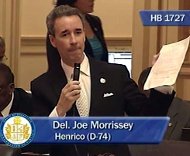1/22/2013
Virginia Rejects Red Light Camera, Speed Limit ReformVirginia House blocks bills that would ban rolling right turn photo tickets and eliminate jail time for 10 MPH speeding tickets.

Photo enforcement reform has been on the minds of Mid-Atlantic lawmakers, but the Virginia House of Delegates has rushed to declare nothing wrong with automated ticketing. By a lopsided 18 to 4 vote last Wednesday, the state House Committee on Science and Technology rejected an effort to place limits on cities using red light cameras to ticket motorists making rolling right-hand turns on red.
"Except where signs are placed prohibiting right-turn-on-red movements, camera citations shall not be issued for right-turn-on-red violations unless there is video evidence that the driver failed to yield right-of-way to a pedestrian, cyclist or other traffic," House Bill 1879, introduced by Delegate Joseph D. Morrissey (D-Henrico), stated.
Though technically illegal, such turns very rarely cause accidents according to data from the US Department of Transportation and the city of Los Angeles, California. Morrissey's language followed the lead of an existing Tennessee state law declaring "invalid" any photo citation issued to vehicles making a right-hand turn on red where such turns are permitted (Tennessee Code Section 55-8-198(i)).
The Old Dominion already prohibits the use of speed cameras, so local and state officials have relied on traditional police ticketing efforts to generate $238 million in annual revenue. Of that amount, $29.5 million came from "reckless driving" citations that can be issued for driving as little as 10 MPH over the speed limit on certain interstate highways.
The reckless driving charge is automatically imposed on anyone accused of traveling at 80 MPH, regardless of the road's speed limit. This created an issue, as Virginia recently raised its top speed limit to 70 MPH without revising the trigger for reckless driving. The offense is a class one misdemeanor carrying maximum penalties of six license points, a fine of $2500, one year in jail and a six-month driver's license suspension -- all for driving a speed that is legal in the states of Texas and Utah.
Morrissey had introduced legislation last month that would revise the reckless driving statute, deleting the 80 MPH trigger so that the severe penalties are only imposed when a driver is accused of traveling 20 MPH over the posted limit. On January 9, the opening day for the General Assembly, a subcommittee of the House Courts of Justice Committee quickly killed the proposal. Delegate Dave Albo, a traffic lawyer and chairman of the Courts of Justice Committee, was the creator in 2007 of the "abusive driver fees" that relied on the expansive definition of reckless driving to impose a mandatory $1050 tax on what was most often minor speeding offense. The effort generated so much outrage that the fees were repealed less than a year later.
Morrissey has also not made many friends in the Republican-dominated chamber. Last Thursday, the Democrat lawmaker pulled out an AK-47 rifle on the House floor, holding it aloft with his thumb inside the trigger guard. The stunt was meant to promote gun control legislation in a body where the GOP holds two-thirds of the seats.


